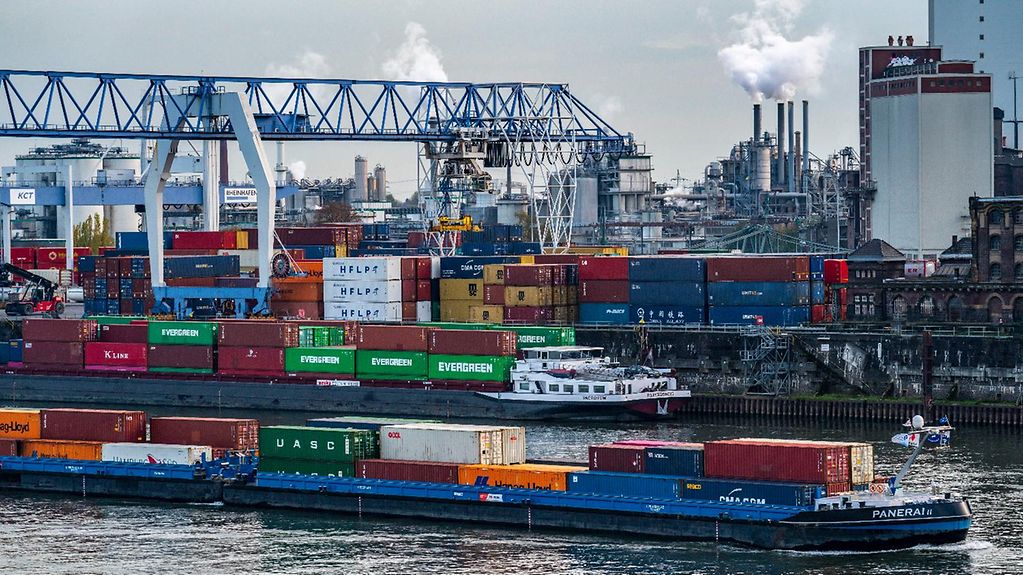2021 Annual Economic Report
This year the German economy is set to grow by about 3.0%. This is the figure quoted by the German government in its latest Annual Economic Report for 2021. Extensive measures are to be taken to stabilise the economy and secure jobs. Here is a round-up of major FAQs.
4 min reading time

The German economy will regain momentum in the course of the year once the pandemic situation stabilises, says the 2021 Annual Economic Report
Photo: picture-alliance / Jochen Tack
How is the economy set to develop this year?
In the course of the year, after the pandemic situation has stabilised, the German economy will regain momentum, states the 2021 Annual Economic Report. For 2021 the German government expects gross domestic product (GDP) to be 3% up on the 2020 figure, in price-adjusted terms. Employment is expected to stagnate on average across the year. That would mean that the unemployment rate would drop slightly to 5.8% in 2021, while the average number of people in work would be 44.8 million.
What does that mean for budget policy?
The German government has taken extensive fiscal measures in response to the challenges posed by the COVID-19 pandemic and thus helped stabilise the economy and secure jobs. In June 2020 it adopted an economic stimulus programme that totalled some 180 billion euros in budget measures for 2020 and 2021. To mitigate losses for employees subject to social insurance and prevent a massive rise in unemployment, the German government made it easier to qualify for short-time working allowance. It was able to leverage the scope for action made possible by its sound financial policy in recent years.
How is the German government supporting businesses and tax-payers?
A pro-growth, internationally competitive and fair tax framework will support swift recovery after the crisis. Citizens and small and medium businesses in particular will see their burden eased significantly in 2021 and 2022. To make the German economy more competitive and more innovative in the medium and long term, the German government is prioritising investment in important sunrise sectors. The package for the future is worth about 50 billion euros. It is part of the economic stimulus programme and provides incentives, particularly in the fields of climate action, energy shift, mobility and digitalisation, areas where we will see the key challenges in the years to come.
How is the German government supporting the skilled labour pool?
To ensure that companies can continue to fully exploit their potential in future too, the German government is stepping up its focus on training and upgrading as well as enhancing the work-life balance. Viable social insurance systems are one important priority. The German government has stabilised social insurance contributions at a maximum of 40 per cent within the scope of its "social guarantee 2021".
Where do we go from here with climate action and the energy shift?
To tangibly reduce greenhouse gas emissions, a decision was taken to end the use of coal to generate electric power. The new target is that 65% of gross electricity consumption is to be generated from renewables by 2030. For the heating and transport sectors a new carbon pricing mechanism was also introduced at the start of the year. Revenue raised is to be used the stabilise the Renewable Energy Act surcharge. A total of nine billion euros is available to implement the national Hydrogen Strategy over the next few years. Under the provisions of the Structural Development Act (Strukturstärkungsgesetz) the German government is providing up to 41 billion euros between now and 2038 at the latest to support structural development in coal-mining regions. This is opening new prospects for former coal-mining regions and for the workforce of the coal industry.
What progress is being made on developing digital infrastructure?
The key objective of the German government in the field of digital policy is to roll out gigabit capable internet connections nationwide by 2025 and to ensure across-the-board mobile communications coverage. Under the provisions of the Act against Competition Restrictions – Digitalisation Act (GWB) the German government has brought national competition law into line with the challenges posed by the digital economy. This includes stricter regulations for platforms with exceptional cross-market importance.
What do we aim to achieve in Europe and in the world?
Within the scope of its Presidency of the Council of the European Union, Germany provided important impetus to make Europe fit for the future. In response to the COVID-19 pandemic, the EU adopted a Recovery and Resilience Facility worth 672.5 billion euros. It is to strengthen the resilience of member states through reform and investment, as well as supporting environmental and digital transformation. All in all the growth potential of the national economies of the EU is to be restored, jobs secured, and sustainable growth fostered. By April 2021 the German government will submit its recovery and resilience plan to the European Commission.
The German government is working for open markets and a rules-based global trading order in which the Word Trade Organization plays a central part. In addition, bilateral trade and investment agreements are important elements of trade policy.
The German government submits an Annual Economic Report to the German Bundestag and the Bundesrat, the two chambers of the German parliament, at the start of each year. It is required to do so under the provisions of Article 2 of the Act to Promote Economic Stability and Growth (Gesetz zur Förderung der Stabilität und des Wachstums der Wirtschaft). In this report, the German government presents central economic and financial policy priorities and gives an outlook for overall economic development for the year. The 2021 Annual Economic Report is entitled "Overcoming the COVID-19 crisis, supporting economic recovery, developing structures".